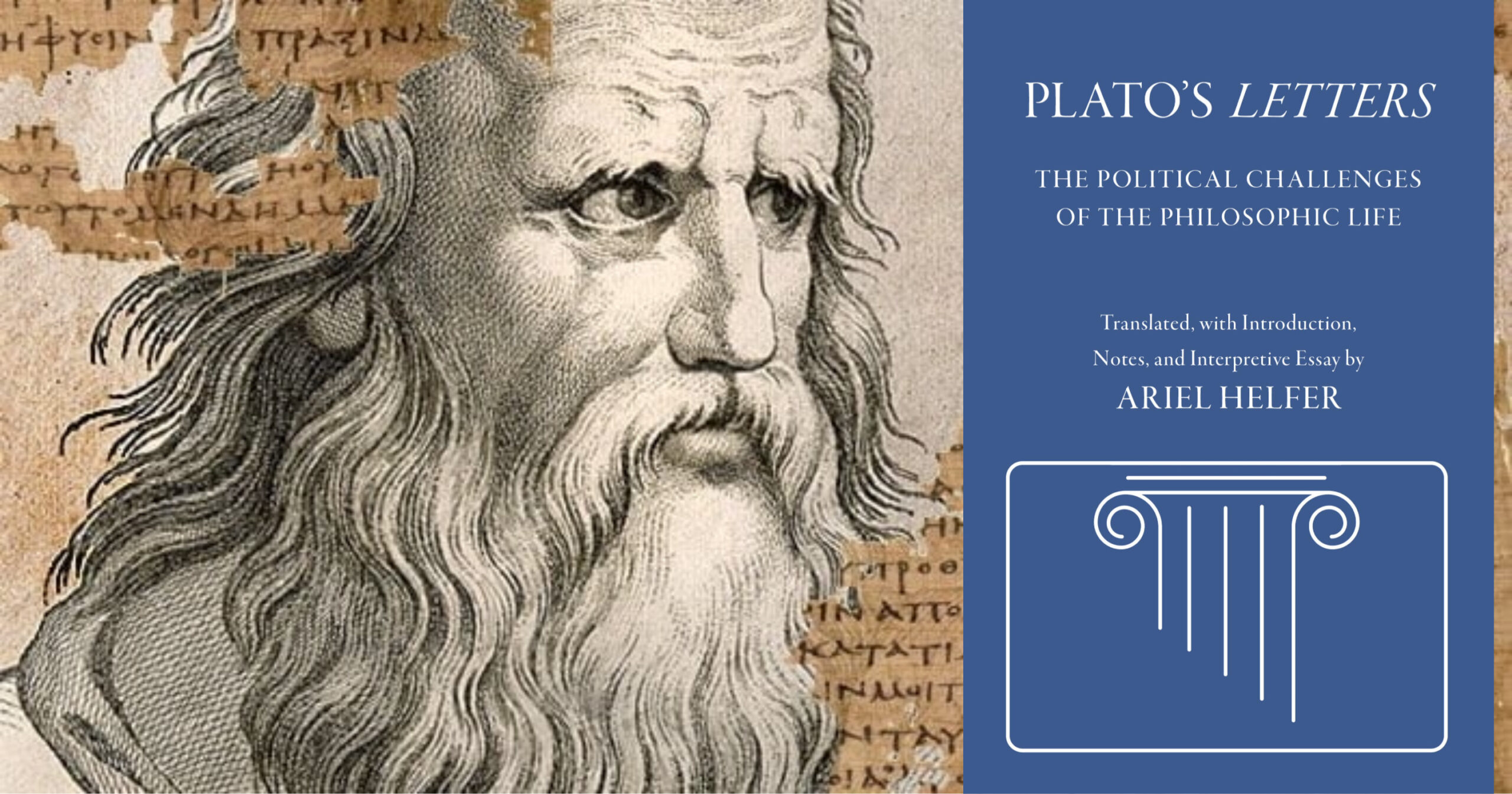We owe Ariel Helfer a good deal of gratitude for his latest effort, a translation of Plato’s Letters that brings to the American audience, for the first time perhaps, the only things Plato wrote in his own name, as opposed to philosophical theater in dialogue form, therefore almost the only thing of an autobiographical character we have concerning the most famous philosopher of all time. But as soon as we say this much, we’re in for a shock: How is it that our academics have not yet studied to death this unique resource? Why don’t we concern ourselves with it whenever we assign Plato’s Republic or the Symposium or the Apology of Socrates to students, indeed to all interested readers?
Here the trouble begins. If Helfer is to help us, he must indict his chosen academic profession for negligence and arrogance. To wit, the opening sentence of his volume: “Consensus eludes scholars on every aspect of Plato’s Letters.” Aren’t scholars supposed to achieve expertise through specialization? Does not that assume that their contributions are commensurable, corporately evaluated for clarity and truth until a body of doctrine or teaching can be established and progressively added to? If they cannot reach a persuasive consensus, why are scholars bothering with nonsense, and why are we all paying for it?
Helfer’s is the politeness of a courageous scholar and shows more daring than I could summon. He means that his profession is a joke; his politeness is owed, ultimately, to the opportunity two centuries of failure to study Plato well have created for us. In the past 200 years, scholars have taken to reorganizing the Platonic corpus to fit Progressive prejudices, getting rid of the traditional nine tetralogies (groupings of the 35 dialogues and the Letters, ironically imitating the groupings of tragic trilogies with a satyr play at the end, the convention at the Athenian tragic festival). To add injury to insult, scholars then proceeded to declare various dialogues and letters spurious, with no ancient authority for this modern usurpation, caused by a certain bashfulness at what these proscribed works might show.
Worst of all, having made themselves a corporate authority over the author whose corpus they were merely supposed to try to understand, scholars then proceeded to create endless elaborate fan-fiction, piled on top of Plato’s own writings, fantasies about which period of his life or what mood is responsible for what Platonic dialogue or argument, thus almost completely blocking access to what the texts, as best they have been preserved, themselves say. This is our situation nowadays. Everyone knows that if you want to find a Shakespeare-hater, the first place you look is in an English department—so also with Plato and philosophy departments.
Enough of that. It’s time to sweep away the fantasies and recover Plato. Artless bunglers have very professionally concealed Plato the artist beneath “secondary sources.” The result is that, in the modern period, more has been written on Plato than ever before, most of it worse than useless, since it’s a burden or a trap for any scholar who wastes his youth among the pallid figures of the scholars.
A strange fate for the philosopher who wrote in such a beautiful way that even to understand his art by comparison to the modern writers we’re more used to, we’d have to somehow put together Nietzsche, Machiavelli, and Rousseau. Those philosophers’ own return to Plato itself suggests a great need to rejuvenate thought and find a way out of the delusions of the institutionalized.
Practically, this is the motive to return to Plato the man as he presented himself in the Letters, the one time he applied his art of writing to himself, which is in a way an education for any artist. Helfer’s elaborate notes use academic tools to free us from academic prejudices—to help us recover the perspective that Plato’s original readers, his first audience, had. His introduction summarizes the scholarly debates and makes the case for thinking about the Letters as one coherent work of art rather than a vague, possibly spurious collection of tidbits. His interpretive essay is a very helpful beginning for readers who want to develop a taste for Plato’s artistry, the way the Philosopher sets the scene and stages any statement or argument, the mix of references, puzzles, and suggestions that makes the arguments feel startlingly human or startle us by pointing from behind the scenes to thoughts and problems that go beyond any specific moment in a drama or an argument. In short, it’s an education because it shows the behavior of an educated man.
Plato usually hides behind Socrates, whose unique characteristic is to be domineering and yet hard to pin down himself. Perhaps Plato must show up himself at least once, because he’s more famous and more of an authority than Socrates. The one time he does, however, it’s in the Letters, which tell the tale of a misadventure involving tyranny, civil war, and therefore every evil known to man—and he might be responsible for it all!
Did political philosophy, as soon as it was founded, start causing the catastrophes for which sober men like Hobbes wanted it banned—inspiring the young to revolt? It’s surely a possibility, given that the past master of the tyrannic education, Machiavelli, advised aspiring princes to steer clear of Plato! For their part, our scholars perhaps stay away from these letters to save Plato’s reputation—after all, he’s the most famous philosopher so far, and maybe philosophy as a whole depends on the reputation of his work. Perhaps they thought they had a good thing going and didn’t want to spoil it.
To summarize the story, in his only known political activity, Plato agreed to go to Syracuse, in Sicily, several times, over decades, to make a go of educating the hereditary tyrant there, Dionysius II, at the behest of the tyrant’s uncle, Dion, who was a follower of Plato. As every decent person could tell you, this was a catastrophically bad idea. After many troubles, Dion got tired of the tyrant and overthrew him, was involved in slaying his own allies, and was finally betrayed himself by his own henchmen. So why did Plato do it? Why play with fire? That’s like asking why Socrates befriended Alcibiades and Charmides, and even Critias. Or why Socrates talked to the scoundrel Menon and offended Anytus, who accused him before the city of Athens and got him executed. Decency is not the only thing to consider—ambition and great talent also count.
Helfer alludes to all this in his subtitle, “The Political Challenges of the Philosophic Life,” and works out an interpretation to match. That’s a polite way of saying that philosophy got Socrates killed and that Plato tried very hard to eat his cake and have it, too: to philosophize and live to tell the tale. Helfer’s daring as an interpreter is to suggest that Plato invented, among other things, the epistolary novel and told his “story” in these Letters, with all the postmodern devices you can think of—unreliable narrator, fragmentary timeline with flashes back and forward, autofiction—which becomes more plausible the more you think about how funny and full of tricks Plato’s dialogues are. Yes, Plato really went to Syracuse. No, the Letters are not real letters, i.e., some accidental remnant of an epistolary exchange dating from those events (which we would have no way of finding out). They are as much a work of fiction as anything else Plato wrote, but with a different protagonist. Their specific character comes from the fact that they allow Plato to reveal himself in the worst light, as “all talk,” while displaying something like a tragedy happening in Syracuse, which he is powerless to influence. They are written for people who think they know Plato from the dialogues and therefore must face this problem. But they also suggest that Plato was involved with a considerable number of rulers in various parts of Greece.
Still, the motive for the Syracusan adventure remains hard to determine. Did Plato go there to educate or moderate the tyrant Dionysius the Younger, who, after all, was his father’s son, not just namesake? (Let us remember that Dionysius I’s reputation was that of a highly successful, and extremely cruel, tyrant-conqueror.) If so, Plato gets the opportunity to rehearse in his own life the accusation against Socrates. But these slanders against himself lead to expulsion rather than death. Success in legitimating a tyranny by curbing its crimes and making it serve a greater good would surely have earned Plato a place among the famous sages of Greece—had he succeeded. But getting away rather than being executed is also success, or at least an improvement over the fate of Socrates. Tyranny can be much more moderate than a legal regime!
However that may be, Plato, unlike Socrates, was willing to get his hands dirty in politics—and perhaps it’s easier to achieve something in a tyranny, where one cannot be endlessly harassed by magistrates, offices, and legal procedures. The Letters sketch this possibility. What if Plato had decided to rely for his reputation—and thus the survival of philosophy—on the pre-democratic past of tyrannies and oligarchies?
Plato chose to rely instead on a school, on manuscripts, on respectability in Athens. His was not the first school of philosophy, but it was the first to concern itself so much and so directly with politics. But this hybrid solution, a mix of the few and the many, still means that impressive men mattered to him. The many might provide justice, but it is the few who will provide the money a school needs. We learn from the dialogues that Socrates had wealthy friends. The Letters also suggest that Plato had powerful friends—consider Archytas of Tarentum. So, did Plato go to Syracuse instead to moderate Dion, his ardent admirer? That is part of the pedagogy of the dialogues—Socrates sometimes arouses impressive hopes in men so as to reveal their souls, but also to disappoint them, which one could call purification or catharsis.
The Letters certainly reveal the failure of friendship. To take only the most important example, Dion needs Plato to help what he intended to be a ruling partnership with his nephew. That would mean a triumvirate, in which Plato would have to be the ruler privately, but Dionysius publicly, with Dion as a noble and a learned man moving between them. Dionysius II is portrayed by Plato in the letters he writes as a remarkably arrogant tyrant, whose distinctive feature is that he acts by halves. He neither executes Dion nor behaves nobly to him; he neither adopts the Platonic course of education, nor shuns it. One learns to suspect that Plato was trying to save the tyrant’s life from an outcome that is almost inevitable. Dion endures injury—exile, expropriation—and insult to himself and his family until he can no longer endure. He then proves his superiority to Dionysius by usurpation; a tyrant needs intellect to supplant law—without it, all that’s left is force.
Ioffer these suggestions by way of introduction to the Letters as well as to Helfer’s very long interpretive essay. Plato offers us an unusual work of art comprising one half of a very involved conversation—he only sends letters, never receives them. The letter, halfway between speech and writing, involves all the Platonic teachings about the art of writing, but in an unusual way. It is supposed to have only one addressee, who understands the context of speech and what the speech is about; but it’s vulnerable to strangers. We’re those strangers and are therefore forced to piece together fictional incidents involving real people from the few pieces we are offered. The intrusion into privacy shows us several kinds of mysteries or secrets, the different kinds of thinking needed to account for human action, or the different uses of the intellect.
The difficulty of interpretation imitates the element of chance that we should never neglect in life, as opposed to art. But the very unusual ordering of the letters is surely artful. We only learn the outline of Plato’s dealings with Dionysius II and Dion in letter 3, after letter 2 warns us against written speeches, after letter 1 had half-persuaded us by its indignant and definitive tone to Dionysios II that none more would follow. Then letter 4 changes things again: Plato now addresses Dion, who has usurped the tyranny, and advises him how to conduct himself successfully. But the dramatic sequence now makes the first three letters a justification for Dion’s behavior. These twists keep coming, and multiple readings of the work are required to achieve an overall view. We are forced, that is, to put everything we believe we know about Plato from the dialogues into an interpretation of his own fictional practical activity—a strange test for an author to place before his audience.
Now, since it’s all made up by Plato, the Letters has a dramatic character, something like a tragedy. It is a success as a work of art precisely because it is an account of a failure of action. We must contemplate the catastrophe of the Sicilian adventure without excusing Plato but also without simply blaming him for associating with tyrants or ambitious men. Life outside Athens ranges from the “antiquity” in which a family rules a city and its domestic quarrels are major political catastrophes to the extreme “modernity” of the age of sophists. This is the context in which Plato presents the fate of philosophy itself, a “realistic” picture, since he presents himself as not in control of the circumstances, unlike in his dialogues, in which he can disappear behind the scenes and orchestrate everything. A full interpretation of the Letters would show how Plato thought philosophy might survive catastrophe after the fall of the Athenian empire, which for better and worse had become the beacon of the sages of Greece.
Helfer offers a somewhat similar spectacle, trying to save philosophy from the tyranny of academia, as well as trying to deal with, so to speak, partisans of Plato who demand that Plato help them in their political activity rather than in their education. His combination of painstaking work as a translator and the daring to strike out on his own, to bring back to philosophy a Platonic work so long discarded and disdained, is certainly admirable. We cannot pay him any higher compliment than to say that we expect that, even as we endeavor to understand everything he has tried to show, he will be working on another scholarly project in the restoration of Platonic political philosophy.
* Titus Techera is a Visiting Fellow in the European Center for Political Philosophy at Mathias Corvinus Collegium, Budapest, and managing editor of the European Journal of Political Philosophy.
Source: https://www.acton.org/religion-liberty/volume-35-number-3/plato-unreliable-narrator






